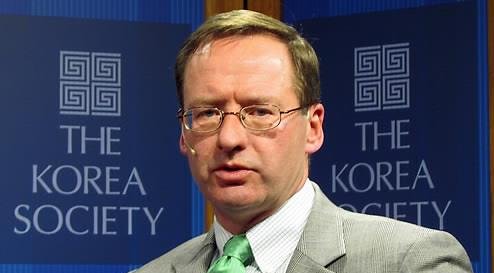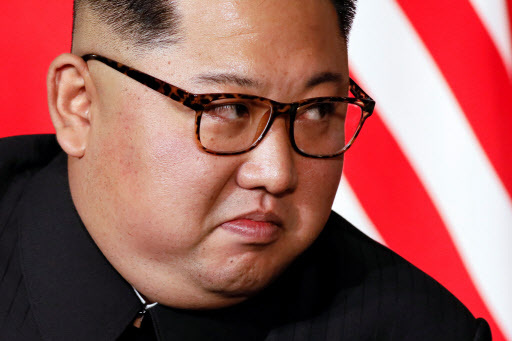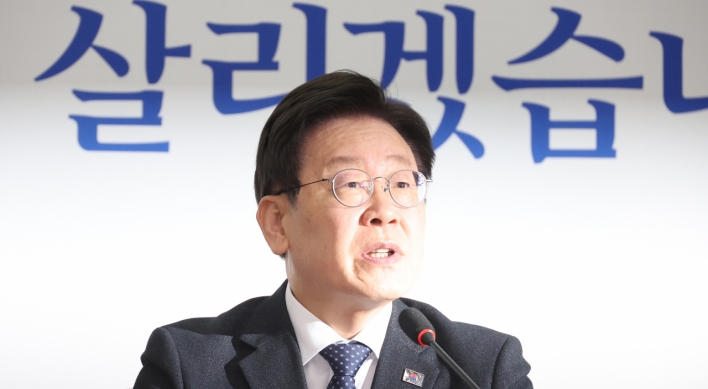‘US, South Korea falling for Kim Jong-un’s tricks’
US experts warn of “emerging gaps” between South Korea and the US in dealings with North Korea
By Ock Hyun-juPublished : Oct. 28, 2018 - 15:36
South Korea and the US are falling for North Korean leader Kim Jong-un’s “tricks,” a US expert said, warning of emerging gaps between the allies amid ongoing negotiations with the reclusive country.
His warning comes amid concerns over South Korea’s efforts to expand cross-border exchanges at a time when North Korea-US talks aimed at moving forward on the denuclearization of the Korean Peninsula appear to be at a standstill.
His warning comes amid concerns over South Korea’s efforts to expand cross-border exchanges at a time when North Korea-US talks aimed at moving forward on the denuclearization of the Korean Peninsula appear to be at a standstill.

“Publicly, the US is very supportive of President Moon and his efforts. The US continues to have a smile publicly on its face, but in my discussion with US officials, they are very, very concerned or even angry about President Moon’s North Korea policies,” Bruce Klingner, a senior fellow at the conservative Heritage Foundation, told a group of reporters in Washington.
“Washington has sent a number of very strong messages to the Moon administration to slow down,” the former CIA deputy division chief for Korea said.
Despite the lack of progress on denuclearization, inter-Korean relations have seen rapid improvement, which South Korea says could help facilitate the denuclearization process and improve US-North Korea relations.
The Koreas completed the removal of guard posts and firearms within the Joint Security Area on Thursday, fulfilling part of the inter-Korean military agreement to reduce cross-border tensions. But it triggered concerns over a lack of “prior consultations” between South Korea and the US.
South Korea’s request for exemptions to the UN and US sanctions -- for the purpose of establishing an inter-Korean liaison office and carrying out projects to connect and modernize railways and roads across the Koreas -- also raised alarm bells in Washington, with critics saying those steps could undermine the US-led pressure campaign.
“Washington has sent a number of very strong messages to the Moon administration to slow down,” the former CIA deputy division chief for Korea said.
Despite the lack of progress on denuclearization, inter-Korean relations have seen rapid improvement, which South Korea says could help facilitate the denuclearization process and improve US-North Korea relations.
The Koreas completed the removal of guard posts and firearms within the Joint Security Area on Thursday, fulfilling part of the inter-Korean military agreement to reduce cross-border tensions. But it triggered concerns over a lack of “prior consultations” between South Korea and the US.
South Korea’s request for exemptions to the UN and US sanctions -- for the purpose of establishing an inter-Korean liaison office and carrying out projects to connect and modernize railways and roads across the Koreas -- also raised alarm bells in Washington, with critics saying those steps could undermine the US-led pressure campaign.

Sanctions relief and the end-of-war declaration have been part of Pyongyang’s demands to build mutual trust with the US as it takes denuclearization steps, since the North committed to the “complete denuclearization” of the Korean Peninsula at the June 12 summit with the US.
Moon has backed the efforts. He rallied international support for the easing of sanctions against the North during his visit to Europe earlier this month, saying such a move could help bring about denuclearization.
China and Russia have also begun to call publicly for sanctions relief to encourage the North to further denuclearize, signaling a crack in the US-led pressure campaign.
“Since the Singapore summit, North Korea has successfully shifted attention away from denuclearization and instead on the steps the US and others have to take to reduce tensions and improve tensions,” Klingner said.
When it comes to declaring an end to the 1950-53 Korean War, it could be “very historic, but also a meaningless feel-good gesture” that will only have serious consequences for maintaining sanctions and the stationing of the US troops and the United Nations Command in Seoul, Klingner said.
If things are different and Kim is willing to denuclearize this time, North Korea should first provide “a complete, verified data declaration” and then accept a “detailed, clear agreement,” he said.

Amid rapidly developing inter-Korean relations, efforts to denuclearize the Korean Peninsula have seen little progress since the June 12 summit. The US said the two sides were working to arrange a second summit.
The US has offered to hold working-level talks in Vienna, Austria, and Pompeo said he expected to meet with his North Korean counterpart within 10 days or so to discuss details of the second summit and the next steps toward denuclearization, but so far North Korea has yet to respond, according to diplomatic sources.
“After the Singapore summit, I think it became clear there was some difficulty on the US-North Korea side. And those difficulties in some ways have yet to be completely resolved,” Scott Snyder, director of the US-Korea policy program at the Council on Foreign Relations, told the reporters.
Comparing the current situation to that of two wheels attached by an axle, Snyder said, “The axle is the US-South Korea alliance."
“But somehow over the course of the past month, I somehow am detecting some emerging gaps between the US and South Korea that I think we need to work hard to manage in order to keep the axle intact," he said.
“But what I can tell you is a car won’t move if the axle is not straight and holding the two wheels together."
By Ock Hyun-ju & Joint Press Corps (laeticia.ock@heraldcorp.com)
-
Articles by Ock Hyun-ju



![[Herald Interview] 'Amid aging population, Korea to invite more young professionals from overseas'](http://res.heraldm.com/phpwas/restmb_idxmake.php?idx=644&simg=/content/image/2024/04/24/20240424050844_0.jpg&u=20240424200058)






![[Hello India] Hyundai Motor vows to boost 'clean mobility' in India](http://res.heraldm.com/phpwas/restmb_idxmake.php?idx=644&simg=/content/image/2024/04/25/20240425050672_0.jpg&u=)







![[Today’s K-pop] NewJeans' single teasers release amid intrigue](http://res.heraldm.com/phpwas/restmb_idxmake.php?idx=642&simg=/content/image/2024/04/26/20240426050575_0.jpg&u=)